Choosing the best WMS vendor for your business

 Now that you know you need a WMS, you need to decide on which WMS and implementation provider best suits your business needs. This is no small task as there are literally dozens of WMS package vendors, custom development houses, implementation providers and system integrators that could potentially be right for your requirement.
Now that you know you need a WMS, you need to decide on which WMS and implementation provider best suits your business needs. This is no small task as there are literally dozens of WMS package vendors, custom development houses, implementation providers and system integrators that could potentially be right for your requirement.
The core elements of choosing the right WMS provider
Before you proceed, please be aware that choosing your WMS implementation provider is of equal and - more often than not - more importance than the software you choose, because purchasing great software but not implementing it successfully will obviously result in high levels of dissatisfaction.
WHAT TYPE OF WMS PROVIDERS ARE THERE?
There are four main variants when it comes to selecting your WMS Provider:
PACKAGED SOFTWARE
A packaged software company typically develops software that is sold to a large customer base. These companies have spent many years and significant amounts of money building out software that focuses on meeting core requirements of warehouse management and can be broken into two core categories:
- Best of Breed – these companies focus specifically on developing software built specifically for warehouse management
- ERP – Enterprise Resource Planning software is focused on the entire enterprise, but some vendors in this space offer warehouse management system modules.
CUSTOM DEVELOPMENT
There are many companies out there that can “build” you a WMS, whether from the ground up, or using a base shell of WMS features and then adding to those based on your requirements.
IMPLEMENTATION PROVIDERS
These companies typically step in once a best of breed or ERP module has been sold and support the vendor via technical and domain expertise in implementing the software.
SYSTEM INTEGRATORS
System integrators will work with you to ensure the core software, hardware and even the physical design and layout of your facility are managed under a single banner during the implementation process.
WHAT SHOULD YOU EXPECT FROM A WMS PROVIDER?
In many instances, it might be obvious as to which type of WMS provider suits your business, but there are always aspects that are not known. It's important to call out some of the important differences between what each partner type typically offers (packaged vs. customised) and explain the detail behind the core offerings they provide:
PACKAGED SOFTWARE VENDOR
Packaged software vendors such as Manhattan Associates develop warehouse management software as their core business. This software is designed to be used across their entire customer base. This has several benefits and considerations:
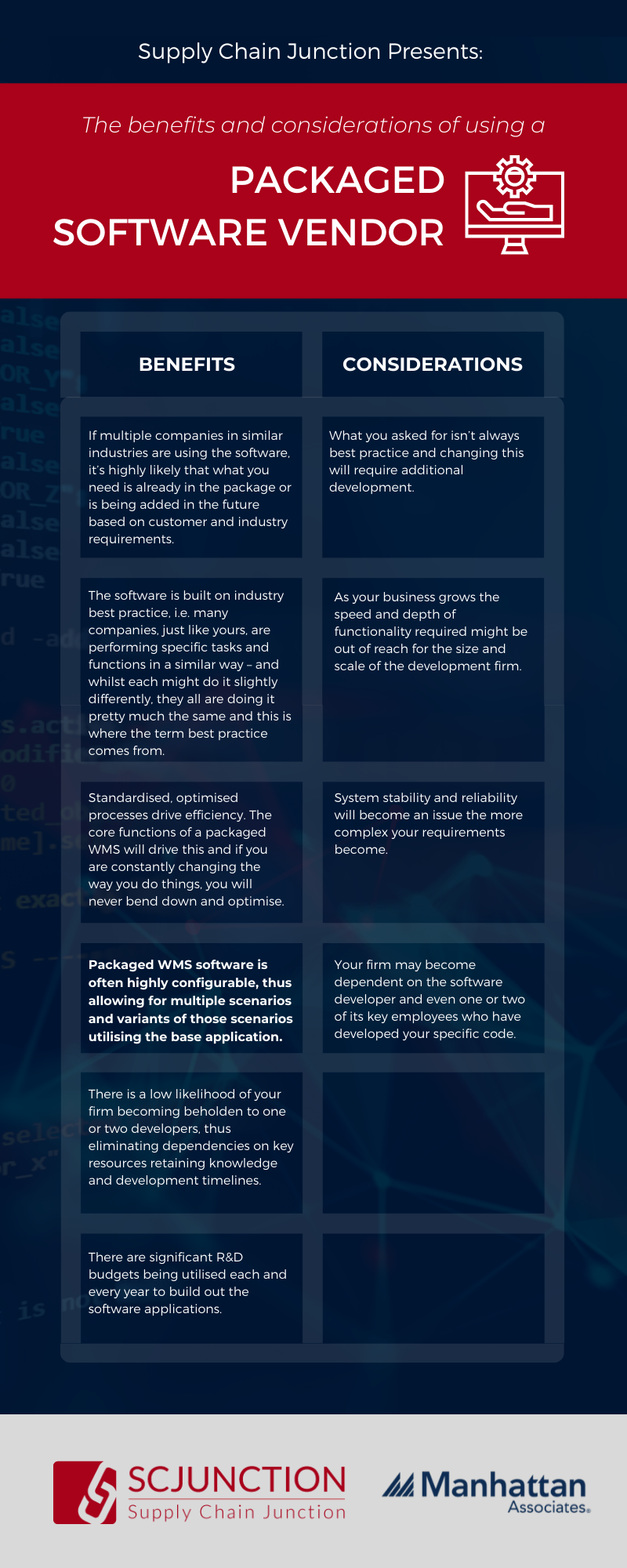
CUSTOM DEVELOPMENT SOFTWARE
Custom development software companies develop applications that are purpose built for their customers there are benefits and considerations:
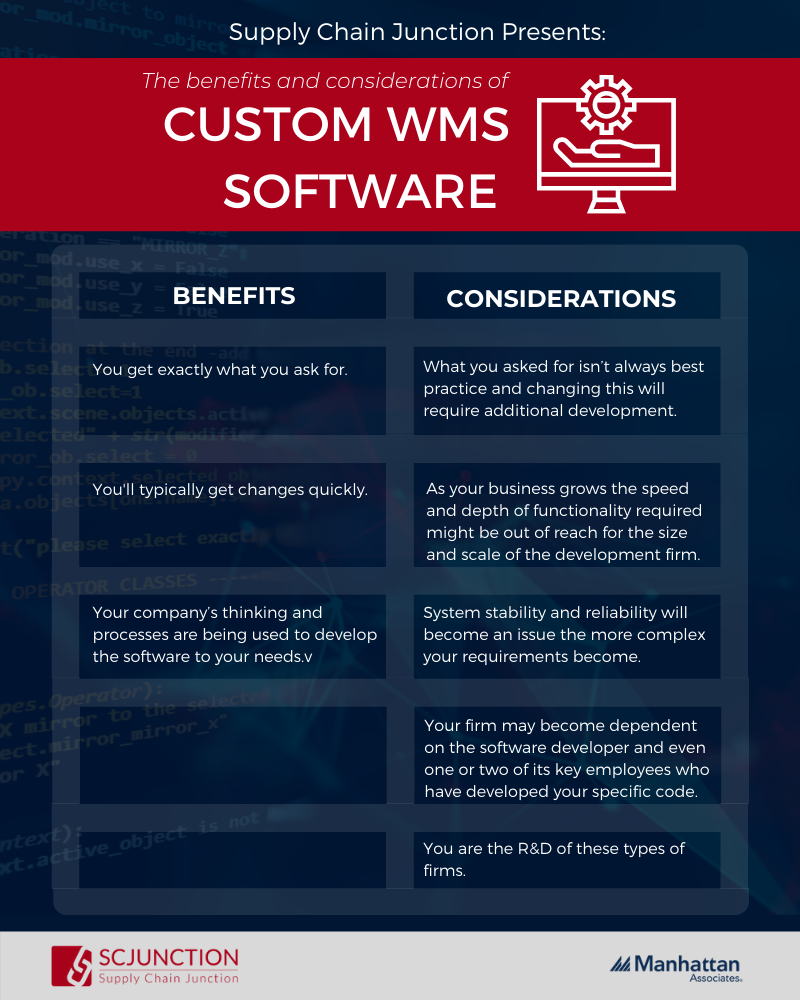
Read the Kolok Success Story to see how they improved their efficiency through exceptional application of Manhattan's packaged solution:
DEFINING YOUR FUNCTIONAL REQUIREMENTS
Functionality is key when choosing any software as the reason you are investing in a WMS is that the functionality will help you execute actions in your warehouse that you either can't do today or do in a manual and labour intensive manner.
When considering the various features and functions provided by WMS providers, the most important thing is to understand, define and document what is important for your organisation not only today, but also for the future. Remember, once you’ve chosen a WMS you’ll typically have it in place for 10-15 years.
DEFINE WHICH FUNCTIONALITY IS IMPORTANT FOR YOUR ORGANISATION WITH THE FOLLOWING PROCESS STEPS:
- Build an internal WMS selection team that will be involved in the entire WMS selection, implementation and post implementation cycle.
- Determine if engaging an external industry expert is appropriate – more often than not it will be.
- Make a list of your top 15-20 current and future challenges, plans and objectives.
- Engage with WMS providers to understand how they can solve those challenges
- See this in action in a demo and at reference sites
- Ensure you understand how future functionality is being developed and can be leveraged, as it is highly likely that you will continue to improve your operation using that functionality after you go live.
- Distribution management is an umbrella term for all of the activities and processes within your warehouse. This includes things like inbound logistics, inventory management, outbound order processing and shipping.
Where possible, adopt best practices, thus avoiding lengthy development timelines and costs.
WHAT IS DEEP DOMAIN EXPERTISE,
AND WHY IS IT IMPORTANT?
Domain expertise can be defined as a person with special knowledge or skills in a particular area of endeavor. There is a common perception that it takes 10,000 hours to become an expert at anything, but this differs vastly according to what you are trying to master.
When is comes to your WMS, we would suggest that once a company has achieved the following they will have built a high level of domain expertise:
- Years of experience in a specific industry vertical – Typically 15 or more
- Number of customers in a specific industry vertical – Typically 100 or more
- Number of employees that service a specific industry vertical – Typically 200 or more
It is more common that packaged software vendors have a greater level of domain expertise as their software is sold into specific industries based on its capability, whereas custom development houses are built to specific customer requirements and will be experts in your business and the software language they use, but not necessarily in your specific industry vertical.
RFP: HOT OR NOT?
The request for proposal process (RFP) has been in place for many years as the standard method that most companies use when choosing a WMS provider.
"Over the years I have filled in dozens of RFP’s and then subsequently have been involved in the implementation that follows. One of the outcomes that most frequently occurs during the implementation following an RFP (and I would suggest that this phenomenon is not limited to WMS) is that the actual requirement of the implementation is vastly if not totally different from the requirement prescribed in the RFP. This often leads to misalignment of expectations, over inflated implementation costs and implementation timelines being missed."
- Michael Badwi, CEO Supply Chain Junction
If you are considering embarking on a warehouse management software RFP, there are 5 key steps, which, if followed, will ensure that you avoid the vast majority of typical mistakes made during the RFP process and that you set a solid foundation for the subsequent implementation.
In our guide to a successful WMS RFP, we outline the core steps that should be considered as part of the process:
SUPPORT
Once you have gone live with a WMS, the support you receive from your WMS provider is critical to your ongoing success. Support is typically delivered in the following forms:
Technical Support
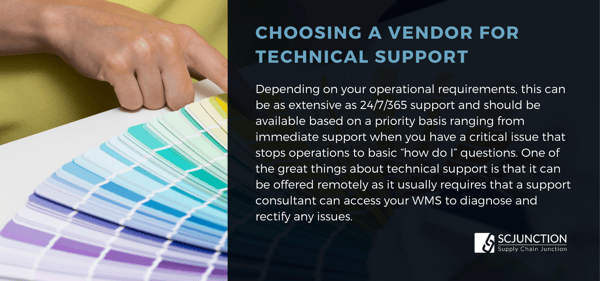
Configuration Support
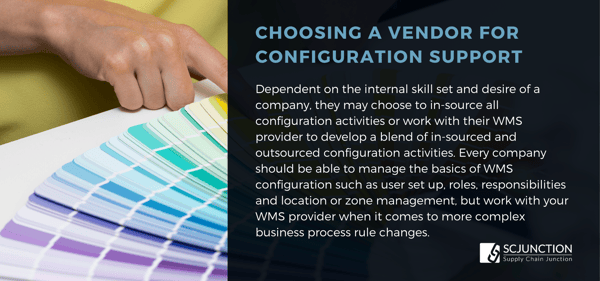
Business Process Improvement Support
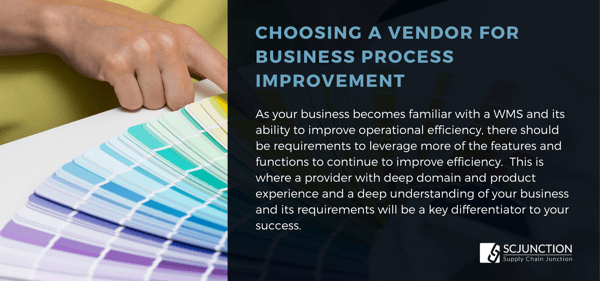
REFERENCE CHECKING
There are plenty of software reference visit checklists to help you ensure you cover off the core governance questions, but perhaps the most important aspects of the reference visits are the learnings that existing customers will share. These will typically include:
- An overview of their operation.
- Core business drivers that have led to them choosing certain configurations over others.
- Why they have chosen specific material handling equipment and how well it works for them.
- External factors that make their operation a success, such as other suppliers and providers.
Once you've worked through the core decision elements to determine the right WMS you need to ensure you confirm the most important reasons to partner with your WMS provider.
Find out more about Supply Chain Junction and Manhattan's success by exploring our case studies, or view our WMS implementation tools:
TAGS
- WMS (51)
- Warehouse Best Practice (46)
- Implementing a WMS (29)
- Managing your warehouse (19)
- Omni Channel (18)
- eCommerce (18)
- Blog (16)
- Supply Chain Best Practice (16)
- Customer Journey (9)
- Mid-Level (8)
- Warehouse optimisation (7)
- General Tips (5)
- Industry General (5)
- Information (5)
- Trends (5)
- managing your Supply Chain (5)
- saudi arabia (5)
- Press Release (4)
- smart warehouse (4)
- 3PL (3)
- News (3)
- ERP (2)
- Entry-level (2)
- ROI (2)
- Case Study (1)
- OMS (1)
- Picking (1)
- Solution-Specific (1)
- Transport Management System (1)
Take A Look At The Results Of A Successful WMS Implementation.
See how Tarsus Distribution, in collaboration with SCJ boost overall efficiency by 60%








